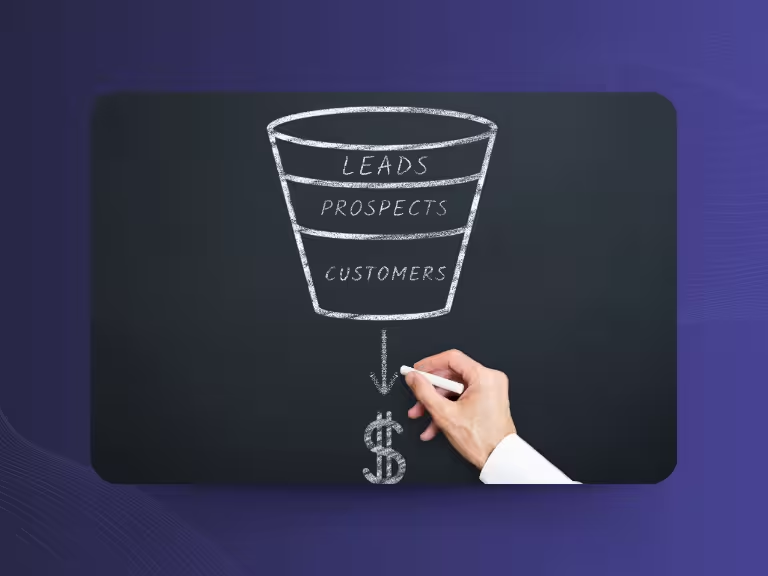In today's digital business world, lead qualification has become an indispensable building block of successful sales strategies. Companies that systematically evaluate and prioritize their potential customers achieve significantly higher closing rates and use their resources more efficiently. The intelligent evaluation of leads is crucial in determining whether sales teams spend their time on promising business opportunities or get lost in endless conversations with unqualified prospects.
The impact of thoughtful lead qualification extends far beyond mere time savings. It influences the entire sales pipeline, shortens sales cycles, and ultimately increases revenue. Modern technologies like AI-powered systems and integrated CRM solutions are revolutionizing how companies evaluate and process their leads.
This article shows you how to optimize your sales processes using proven qualification models, modern technologies, and field-tested strategies. From defining basic concepts to concrete implementation strategies and success measurement, you'll get a comprehensive overview of effective lead management.
What is Lead Qualification? Definition and Significance
Basic Definition
Lead qualification describes the systematic process of evaluating and prioritizing potential customers based on defined criteria. It's about identifying those prospects from the mass of all interested parties who are most likely to become paying customers.
A central aspect of lead qualification is the distinction between Marketing Qualified Leads (MQL) and Sales Qualified Leads (SQL). MQLs are leads generated through marketing activities that show initial purchase interest signals but are not yet ready for direct sales contact. SQLs, on the other hand, have already demonstrated concrete purchase interest and are ready for processing by the sales team.
This differentiation enables targeted control of lead nurturing processes and optimization of the handoff between marketing and sales. While MQLs continue to be supplied with relevant content and information, SQLs can be immediately included in the active sales process.
Why Lead Qualification is So Important
The importance of lead qualification becomes particularly clear when considering resource allocation in sales. Studies show that sales representatives often spend up to 70% of their time on unqualified leads. Through effective qualification, they can focus on the most promising 30% and thereby increase their closing rates by 20-30%.
Another crucial advantage lies in avoiding waste of time and costs. When sales teams focus their energy on qualified leads, sales cycles are significantly shortened. At the same time, employee motivation increases as they achieve successful closings more frequently.
The higher closing rate through focused outreach directly impacts company performance. Companies with systematic lead qualification report an average increase in revenue of 15-25% while simultaneously reducing acquisition costs.

Criteria and Methods of Lead Qualification
Proven Qualification Models Overview
The BANT model (Budget, Authority, Need, Timeline) belongs to the classic approaches of lead qualification. It systematically checks whether a lead has the necessary budget, possesses decision-making authority, has a concrete need, and has defined a realistic timeframe for the purchase decision. Although proven, BANT reaches its limits in more complex B2B sales processes.
The CHAMP model (Challenges, Authority, Money, Prioritization) places stronger focus on the potential customer's challenges. It begins with identifying concrete problems before considering budget and decision-making authority. This approach is particularly well-suited for solution-oriented sales strategies.
MEDDIC (Metrics, Economic buyer, Decision criteria, Decision process, Identify pain, Champion) is considered one of the most comprehensive qualification models. It considers measurable success metrics, identifies the economic decision-maker, and analyzes both decision criteria and processes. Additionally, an internal advocate (Champion) is identified to support the sales process.
Combining Manual and Automated Qualification
The most effective lead qualification emerges through the intelligent combination of manual and automated approaches. While sales teams provide indispensable assessments with their experience and intuition for interpersonal nuances, automated systems can analyze large amounts of data in real-time.
Automated lead scoring uses algorithms to evaluate leads based on predefined criteria. Both demographic data and behavioral characteristics are incorporated. A lead who has downloaded multiple whitepapers, visited pricing pages, and participated in a webinar automatically receives a higher rating than a lead with minimal interaction.
Behavioral qualification analyzes the digital behavior of potential customers. Website visits, email open rates, social media interactions, and download activities are combined into a comprehensive picture of purchase readiness. This data makes it possible to determine the optimal timing for sales contact.
Technological Support and Integration into CRM Systems
Artificial Intelligence and Automation in Lead Qualification
AI-powered systems are revolutionizing lead qualification through their ability to analyze large amounts of data in real-time. They recognize patterns that are often invisible to human observers and generate precise predictions about the closing probability of individual leads. Machine learning algorithms continuously improve their prediction accuracy by learning from past sales successes and failures.
A particularly effective approach is predictive lead scoring, where AI systems predict the probability of a sales closing. These systems analyze not only static data but also consider temporal developments in lead behavior. For example, they can recognize when a lead transitions from the information phase to the purchase phase.
Automated lead nurturing through chatbots and intelligent workflows makes it possible to continuously care for leads without tying up human resources. These systems can answer simple questions, suggest relevant content, and determine the optimal timing for handoff to the sales team.

CRM Integration as Key to Seamless Processes
Modern CRM platforms like Salesforce, HubSpot, and Microsoft Dynamics offer comprehensive lead qualification modules that can be seamlessly integrated into existing sales processes. These systems enable automatic updating of lead evaluations, informing sales teams about important changes, and tracking the entire customer lifecycle.
Successful CRM integration requires clear definition of lead status and handoff processes. Best practice is to define clear criteria for the handoff from marketing to sales and automate these in the CRM. This ensures that only truly qualified leads reach the sales team.
The use of APIs enables individual customization of lead qualification systems and linking with other business applications. For example, meeting transcriptions can be automatically analyzed to identify purchase signals and update lead evaluations accordingly.
Best Practices for Implementation and Success Measurement
Training and Education for Sales Teams
Successful lead qualification depends on the competence of sales representatives. Technical know-how about the tools used must be combined with methodical skills for conversation management and needs analysis. Without continuous training, even the best qualification systems remain ineffective.
Regular workshops and online training should cover both the use of technical tools and the application of chosen qualification models. Practical role-plays and analysis of real customer conversations help transfer theoretical knowledge into practical skills.
Training in the use of CRM systems and automated lead scoring tools is particularly important. Sales representatives must understand how the evaluation algorithms work and how they can optimally use the generated insights for their sales conversations.
Measuring KPIs and ROI of Lead Qualification
Measuring the effectiveness of lead qualification requires the definition of clear metrics. The conversion rate from MQL to SQL is a central indicator of the quality of marketing-generated leads. Ideally, this rate should be 20-30%, depending on the industry and product.
Other important KPIs are the closing rates of qualified leads, average sales cycle duration, and cost per acquisition. These metrics provide insight into whether qualification processes actually lead to better sales results.
ROI analyses should compare the costs of lead qualification tools, training, and personnel resources against the generated additional revenues. Companies with effective lead qualification typically achieve an ROI of 300-500%, as investments in better processes and tools quickly pay off through higher closing rates.

Using Practical Examples and Case Studies
Concrete success stories make the benefits of lead qualification tangible. HubSpot customers, for example, report an average increase in their closing rates of 27% after implementing automated lead scoring systems. This improvement resulted in an average revenue increase of 18% while simultaneously reducing acquisition costs by 15%.
A particularly impressive example is a software company that was able to shorten its sales cycles by 40% through the combination of MEDDIC qualification and AI-powered lead scoring. Focusing on highly qualified leads led to a doubling of the closing rate per sales representative.
Demonstrating value to stakeholders should include both quantitative and qualitative aspects. In addition to measurable improvements in revenue and efficiency, employee satisfaction also increases as sales representatives can spend more time on promising conversations.
Summary and Outlook
Lead qualification has evolved from an optional sales tactic to an indispensable success factor for modern companies. The systematic evaluation and prioritization of leads enables optimal resource allocation and significant increases in closing rates. Proven models like BANT, CHAMP, and MEDDIC form the methodical foundation for effective qualification processes.
The combination of traditional qualification approaches with modern technologies like AI-powered lead scoring and automated CRM workflows creates new possibilities for scalable and precise lead evaluation. Companies that intelligently deploy these technologies can significantly optimize their sales processes while improving the customer experience.
Continuous training and measurable success monitoring are crucial for the sustainable success of lead qualification initiatives. Regular analysis of KPIs like conversion rates and ROI helps continuously optimize processes and extract maximum benefit from implemented systems.
Future developments in lead qualification will be even more strongly influenced by AI innovations. Predictive analytics will enable more accurate predictions about purchase probabilities, while smart automation will further blur the line between marketing and sales. Companies that invest in modern lead qualification today are laying the foundation for long-term sales success in an increasingly digitized business world.

Test Meeting Transcription now!
We'll help you set everything up - just contact us via the form.
Test NowOr: Arrange a Demo Appointment





